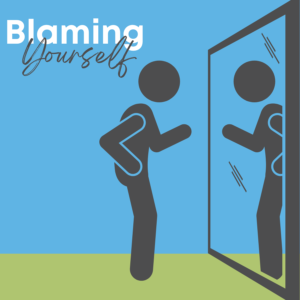 Negative and repetitive thought patterns are present in both anxiety and depression. There are many cognitive distortions present in negative thinking. Many of these thoughts take the form of negative automatic thought (NAT) patterns.
Negative and repetitive thought patterns are present in both anxiety and depression. There are many cognitive distortions present in negative thinking. Many of these thoughts take the form of negative automatic thought (NAT) patterns.
One specific negative automatic thought is personalization. Blaming oneself and over-apologizing are both common behavioral patterns related to this automatic thought.
Personalization is a very common thinking error in which a person takes things personally that they are not primarily responsible for. A person may blame themselves for events that are not caused by them (or perhaps not even connected at all). A person may assume fault for things outside of their control and feel the need to apologize.
Do you know someone who is constantly apologizing even when you’re clearly not at fault? Whether it is a pattern triggered by guilt, a tendency towards “people-pleasing” or possibly associated with mental health conditions, there are other options.
Try pausing before responding and start with a thank you versus an apology.
For example, instead of “I am so sorry that I cannot come to your [fill in the blank] but I [explanation of your reason].” Try this: “Thank you for inviting me to [fill in the blank]. I can’t make it.”
Practicing these skills can be difficult and take practice. Many people feel the need to give an explanation or feel pressured to give answers to questions that they don’t feel comfortable responding to. Maybe you are saying no to an event because you need a night in to take some time for self-care. Remember that you do not owe others an explanation.
You are not responsible for the way others feel. One danger in relationships is feeling responsible for someone else’s happiness. This can be especially challenging if a friend or family member is struggling with substance abuse or mental health. When one engages in personalization, they are assuming responsibility for another person’s feelings and struggles–taking-things-personally. For those that struggle with people-pleasing, if not all people in your party are happy, then you may feel as if you are to blame or feel guilty which can lead to other distorted thinking patterns. You are responsible; however, for your feelings and can actively take steps to address what you are experiencing.
You are also responsible for your actions. Note: It is important to be accountable and take responsibility for your part in an interaction. For example, if you said something hurtful to your partner, own up to this and apologize. The importance of apologizing can help mend trust and relationships and resolve conflicts.
If you struggle with self-blame, over-apologizing, or assuming personal responsibility for the feelings and actions of others, therapy can help. Distorted automatic thoughts such as personalization respond well to cognitive-behavioral therapy, using techniques such as cognitive restructuring. If you would like to talk to a mental health specialist contact CARE Counseling at 612-223-8898. https://care-clinics.com/
Written By: Charlotte Johnson, MA, LPCC
We’re Here to help
Our wellness experts will be happy to take care of you. You can CLICK HERE to schedule an appointment now or call (612)223-8898.
Meet Clinicians
We’re united by our commitment to providing effective, relevant, and innovative mental health support at all stages of your journey. Click Here to find a therapist or find out more about who we are, where we come from, and how we live out CARE’s mission every day.
The professionals at CARE are actively collecting and creating resources to help with what you need and address frequently asked questions. We’re Here for You.



